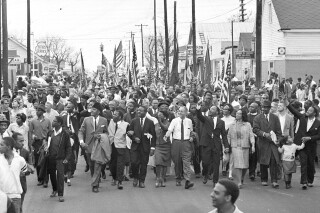Today in History: March 21, Martin Luther King Jr. leads civil rights march from Selma to Montgomery

Dr. Martin Luther King, fourth from right, waves as marchers stream across the Alabama River on the first of a five day, 50 mile march to the state capitol at Montgomery, Ala., on March 21, 1965. (AP Photo)
Today in History:
On March 21, 1965, civil rights demonstrators led by the Rev. Martin Luther King Jr. began their third, successful march from Selma to Montgomery, Alabama.
On this date:
In 1685, composer Johann Sebastian Bach was born in Eisenach, Germany.
In 1935, Persia officially changed its name to Iran.
In 1945, during World War II, Allied bombers began four days of raids over Germany.
In 1952, the Moondog Coronation Ball, considered the first rock and roll concert, took place at Cleveland Arena.
In 1972, the Supreme Court, in Dunn v. Blumstein, ruled that states may not require at least a year’s residency for voting eligibility.
In 1990, Namibia became an independent nation as the former colony marked the end of 75 years of South African rule.
In 1997, President Bill Clinton and Russian President Boris Yeltsin wrapped up their summit in Helsinki, Finland, still deadlocked over NATO expansion, but able to agree on slashing nuclear weapons arsenals.
In 2006, the social media website Twitter was established with the sending of the first “tweet” by co-founder Jack Dorsey, who wrote: “just setting up my twttr.”
In 2007, former Vice President Al Gore made an emotional return to Congress as he pleaded with House and Senate committees to fight global warming; skeptical Republicans questioned the science behind his climate-change documentary, “An Inconvenient Truth.”
In 2012, meeting out unprecedented punishment for a bounty system that targeted key opposing players, the NFL suspended New Orleans Saints head coach Sean Payton without pay for the coming season and indefinitely banned the team’s former defensive coordinator; Commissioner Roger Goodell fined the Saints $500,000 and took away two draft picks.
In 2013, in the Middle East, President Barack Obama insisted “peace is possible” as he prodded both Israelis and Palestinians to return to long-stalled negotiations with few, if any, pre-conditions.
In 2016, laying bare a half-century of tensions, President Barack Obama and Cuban President Raul Castro prodded each other over human rights and the longstanding U.S. economic embargo during an unprecedented joint news conference in Havana.
In 2017, at his Senate confirmation hearing, Supreme Court nominee Neil Gorsuch declared he’d made no promises to President Donald Trump or anyone else about how he would vote on abortion or other issues.
In 2019, President Donald Trump abruptly declared that the U.S. would recognize Israel’s sovereignty over the disputed Golan Heights, a major shift in American policy.
In 2020, during a White House briefing, President Donald Trump doubled down on his support for the malaria drug hydroxychloroquine as a possible treatment for the coronavirus, while Dr. Anthony Fauci said the evidence was “anecdotal.”
In 2022, a China Eastern Boeing 737-800 with 132 people on board crashed in a mountainous area of southern China, setting off a forest fire visible from space in the country’s worst air disaster in nearly a decade. (All 123 passengers and nine crew members would later be confirmed dead.)
In 2023, Willis Reed, who dramatically emerged from the locker room minutes before Game 7 of the 1970 NBA Finals to spark the New York Knicks to their first championship and create one of sports’ most enduring examples of playing through pain, died at age 80.
